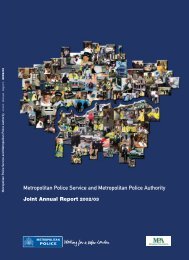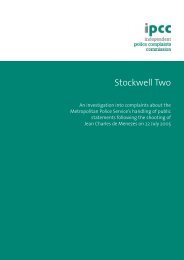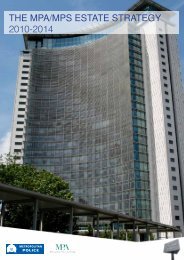Final Report of the Morris Inquiry: The Case for Change
Final Report of the Morris Inquiry: The Case for Change
Final Report of the Morris Inquiry: The Case for Change
You also want an ePaper? Increase the reach of your titles
YUMPU automatically turns print PDFs into web optimized ePapers that Google loves.
THE CASE FOR CHANGE<br />
“Rhetoric needs to be converted into reality.”<br />
Introductory Booklet on <strong>the</strong> Diversity Excellence Model<br />
Recognising <strong>the</strong> importance <strong>of</strong> managing difference<br />
5.1 Be<strong>for</strong>e we comment on <strong>the</strong> approach <strong>of</strong> <strong>the</strong> MPS to managing difference, we<br />
consider it helpful to examine <strong>the</strong> reasons why <strong>the</strong> MPS and o<strong>the</strong>r public and<br />
private organisations should place much emphasis on issues <strong>of</strong> diversity.<br />
5.2 ‘Diversity’ can be a valuable organisational tool which allows <strong>the</strong> organisation<br />
to state its values and deliver its message and mission. It demonstrates that <strong>the</strong><br />
organisation sees people as individuals with a set <strong>of</strong> individual characteristics which<br />
should be understood, respected and valued.<br />
5.3 It goes without saying that <strong>the</strong>re is a strong moral case <strong>for</strong> an organisation<br />
to respond to individual needs but <strong>the</strong>re is also a strong business case, which<br />
includes:<br />
“Widening <strong>the</strong> pool <strong>of</strong> potential recruits, improving service delivery to diverse groups by<br />
increasing <strong>the</strong> diversity <strong>of</strong> staff and meeting <strong>the</strong> requirements <strong>of</strong> legislation.”<br />
(Directions in Diversity, <strong>the</strong> Audit Commission)<br />
5.4 However, managing difference is not just about having a policy. A policy<br />
cannot be a substitute <strong>for</strong> action. Process, however important, is in reality a means<br />
not an end and must never eclipse outcomes. Achieving outcomes requires<br />
leadership and commitment at all levels <strong>of</strong> <strong>the</strong> organisation.<br />
5.5 Any organisation which is not focused on managing difference will risk failing<br />
to meet its legal obligations and, most importantly, non-delivery <strong>of</strong> high quality<br />
services.<br />
5.6 For <strong>the</strong> MPS, <strong>the</strong> consequences are even more serious. Without <strong>the</strong> right<br />
approach, it will not achieve its aspiration <strong>of</strong> becoming <strong>the</strong> employer <strong>of</strong> choice in<br />
London but, even worse, <strong>the</strong>re is a danger <strong>of</strong> <strong>the</strong> real advances it has made in<br />
policing <strong>the</strong> capital being thrust into reverse.<br />
Managing difference<br />
5.7 When we use <strong>the</strong> term ‘managing difference’ we are not simply referring to<br />
managing people. <strong>The</strong> concept is much wider and also refers to strategic<br />
management, as well as managing resources, reputation, risk, communications<br />
and, <strong>of</strong> course, service delivery.<br />
98


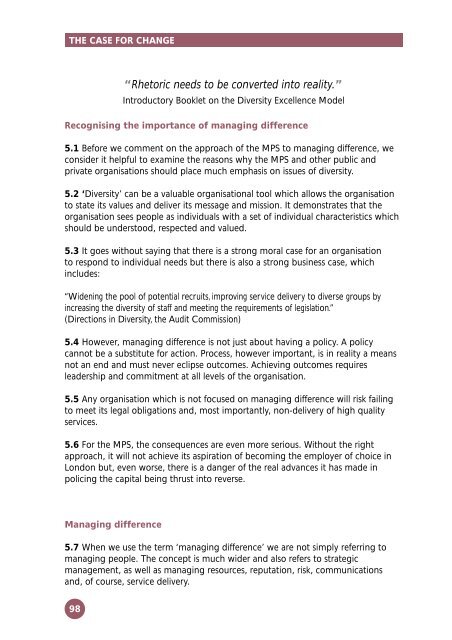
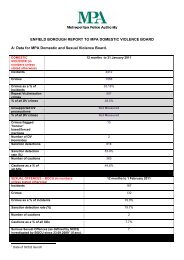
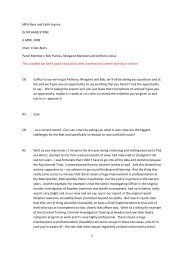
![Appendix 1 [PDF]](https://img.yumpu.com/51078997/1/184x260/appendix-1-pdf.jpg?quality=85)

![Transcript of this meeting [PDF]](https://img.yumpu.com/50087310/1/184x260/transcript-of-this-meeting-pdf.jpg?quality=85)
![Street drinking in Hounslow [PDF]](https://img.yumpu.com/49411456/1/184x260/street-drinking-in-hounslow-pdf.jpg?quality=85)

